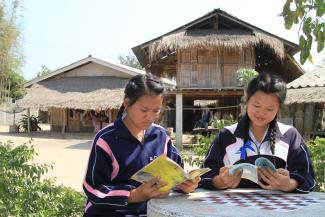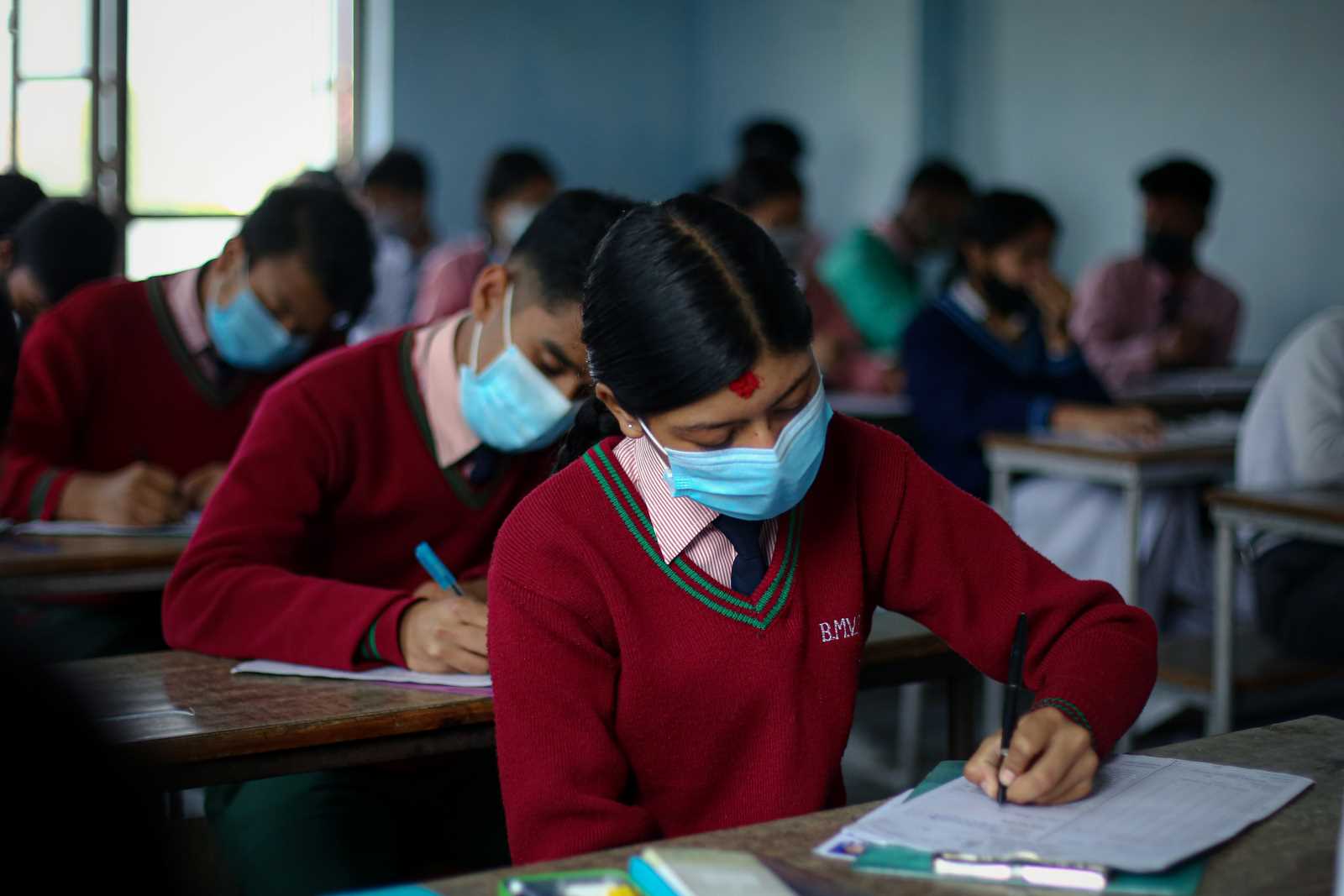Minorities
Stateless and without rights

The DNA test results should already be available, but nobody answers the telephone at the hospital. It is lunch time. Buya and Armer Mayer are anxiously waiting: If the result is positive, it will dramatically change their life.
Buya, 14, and Armer, 19, were born in Thailand but do not have citizenship. Their parents, who have already passed away, were stateless, and they failed to register their children’s birth. The DNA test can prove the two orphans’ genetic relationship to their aunt, a Thai citizen with full rights. That would finally entitle them to get the proof of identity they are hoping for. “I am mostly looking forward to being able to go anywhere without fearing the police,” says Armer. “An ID card would give us freedom.”
Not having a legal presence in their home country means that Buya and Armer can be detained by the police at any time. The risk is high: In northern Chiang Mai province, where they live, there are many checkpoints and inspections. The area is part of one of the world’s major drug routes. The Golden Triangle, the second largest opium poppy cultivation region after Afghanistan, is less than one hundred kilometres away. Buya and Armer belong to the Akha ethnic minority. There are an estimated 1.2 million people who belong to 20 different ethnic groups in northern and western Thailand. All of these groups, also known as hill-tribes, have their own distinct language and culture. According to Plan International, a non-governmental organisation that specialises in children’s issues, 37 % of these people lack formal citizenship. They are therefore denied basic rights including the right to equality and the right to a nationality. They cannot get formal employment, travel freely or vote. They are also denied the right to a registered marriage and most social-welfare benefits.
Official sources put the number of stateless people in Thailand at around half a million. Plan International estimates the real number is actually twice as high. Most stateless people are children. The second major group, besides the hill-tribes, consists of refugees and migrants from Myanmar. Furthermore there are the Moken, sea nomads living in the Andaman Sea.
According to estimates by the UN Refugee Agency UNHCR, twelve million people worldwide are stateless. Thailand is one of the countries with the highest numbers. Armer and Buya were the first in their family to go to school and learn to speak, read and write Thai. ”I am very proud of this“, says ninth-grader Armer, who started school at the age of ten.
The siblings’ older brother is 25 years old and had no schooling at all. He works as a masseur in the provincial capital of Chiang Mai, 200 kilometres away from home. “He sends us money regularly so we can study,” says Buya, who is in grade eight. “I am very grateful to him.” But the money does not buy much. Buya and Armer could not afford the DNA test that would prove their genetic origin. It costs approximately 227 Euro for both girls. Plan International covers the costs in cases like theirs. “A DNA test is the last resort,” says Summit Wophapho, who coordinates the organisation’s Universal Birth Registration programme. The goal is to ensure that every child born is registered as well as to get unregistered children and adults registered.
In many cases, it suffices to present documents and testimonies that prove that an applicant for citizenship was born in Thailand or has been living there for a long time. This is the approach taken by Meethor Arjee, whose application Summit, the Plan officer, has prepared.
Meethor is Akha, like Buya and Armer. She lives in the same village of Baan Pa Deang in Mae Ai district. But Summit knows it is easier for her to get the Thai citizenship because she was born before 1992. According to the Nationality Act of 2008, people born in Thailand before 1992 or who have been living here before 1992 may become legal Thai citizens – regardless of their parents’ status. For those born after 1992 it is more complicated and depends on the situation. It is not sufficient to be born in Thailand to get the citizenship.
Meethor is 28 years old and has never been to school. Since she lacks education and, as a stateless person, is not allowed to own land, the only way for her to earn a living is by working as a day labourer on other people’s farms. “I get 200 Baht for eight hours of work,” she says. The sum equals € 4.50. The legal minimum wage in Thailand is 300 Baht per day. Stateless and without rights, Meethor cannot even claim this small amount.
Since stateless people cannot work legally, almost all families live from hand to mouth. Many girls end up in prostitution. UNESCO has identified lacking citizenship as the main risk factor for becoming a victim of trafficking and exploitation.
Abused as slaves and prostitutes
“The karaoke bars and massage salons are full of stateless girls,” confirms Summit. Plan International’s researchers have documented many human-rights violations. Among other things, children are abused as slaves and prostitutes. That happens in Thailand and abroad.
Obviously, a state cannot protect children it has no knowledge of. Jaka Janoo from the Lahu hill-tribe has been deaf since birth. His village Baan Na Ma-eurn is in a very remote mountain area near the Myanmar border. The 28 year-old has never been examined by a doctor, has had no education and has not been taught sign language. Since childhood, Jaka has been helping his mother in the fields. His communication is limited to the expression of basic needs. Jaka has left the surroundings of his village only once to accompany his 24 year-old brother Arun to Fang, the district capital two hours away. But he was sent back by police before reaching his destination.
Jaka has applied for citizenship with the help of Plan. He knows that after obtaining an ID card he will not have to fear the police anymore. What he does not yet know, because nobody was able to tell him, is that he will also get health insurance and a monthly allowance of 1200 Baht (about € 27) due to his disability.
That money will make a difference to his family’s livelihood. So far, they do not always have enough to eat. “The money is enough for Jaka to live of”, says Arun, the only one who went to school, speaks Thai and owns a rice field thanks to his marriage to a Thai citizen.
There are several reasons why villagers from ethnic minorities do not apply for citizenship even though it is their right. The people do not know their rights, they are illiterate, they do not speak Thai, and they are excluded from mainstream society. Moreover, the district office is far away, and the journey there is exhausting and expensive. Plan worker Summit also mentions corruption and discrimination. “The Thai law is good”, he says. “The problem is poor implementation at the local level.”
Nevertheless, it makes sense to embark on the arduous path towards an ID card, even if it may take years to get one. Noi Layoi understands the matter. The 21 year-old member of the Palaung minority lives in Baan Suan Cha in Fang district. The village consists of 108 households; approximately 70 % of the inhabitants are stateless. Decades ago, the older generation crossed the mountains from Myanmar on foot, fleeing bloody conflicts and poor living conditions.
Noi is one of almost 6000 mainly young people who have obtained Thai citizenship with the help of Plan. “My salary has since doubled,” she says. As a stateless person she used to earn 4000 to 5000 Baht per month working on corn fields or orange plantations. Including paid overtime, she now makes up to 10,000 Baht as an employee of a corn-processing factory. That is enough for Noi, who is divorced and lives with her parents, to support herself and to send her seven-year-old daughter Janyaporn to school.
Noi has a dream: “Janyaporn will be a medical doctor and help other people.” Noi herself only completed third grade. After that she had to earn money.
Maja Cubarrubia is the country director for Plan International in Thailand. She regards education, especially for girls, as the top priority: “Obtaining the citizenship is not sufficient, we have to work on qualifying those young people.” The organisation engages private-sector companies such as hotel groups, for instance, to provide training programmes so even school dropouts can learn skills that are in market demand.
For destitute young women who have completed all twelve years of school Plan even provides university scholarships, and 40 hill-tribe women have benefitted from this programme so far. The target is 500. “Every girl who gets an education, will not marry early, will have children later, will not be trafficked and is thus a success,” says Maja Cubarrubia.
In the meantime Buya and Armer have got the result of their DNA test. The genetic relationship with their aunt is confirmed. Next, they will apply for Thai citizenship. Their future looks brighter than it did before.
Katja Dombrowski is a freelance journalist based in Bangkok.
kd@katja-dombrowski.info










